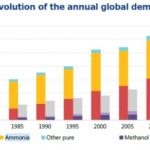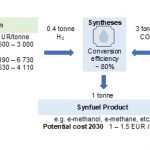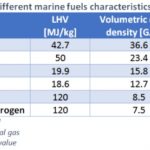So far, 58 national hydrogen strategies and roadmaps have been published. Anne-Sophie Corbeau and Rio Kaswiyanto at the Center on Global Energy Policy take a close look, summarising their regularly updated database, the “National Hydrogen Strategies and Roadmap Tracker.” Only 12 countries are planning to become importers, mostly in Asia and Europe. Most of the others plan to be exporters. Many existing fossil fuel exporters want to preserve their … [Read more...]
Making solid fuel from captured CO2 (with a 96% conversion rate)
What if CO2 could be captured and, rather than locked away underground for eternity, turned into a stable powder that can be used in fuel cells to produce electricity? David Chandler at MIT describes research there and at Harvard that has demonstrated a new process that has a 96% conversion rate. It’s been tried before, but the conversion rates were an unusable 20%. The CO2 is converted into formate and used like hydrogen or methanol (both strong … [Read more...]
Europe’s big Hydrogen ambitions won’t deliver. Stick to ammonia-fertiliser, refining, shipping, aviation (maybe later)
Europe’s hydrogen ambitions need a reality check. The EU’s goal to produce and import 20m tonnes of clean hydrogen by 2030 is now widely seen as completely unrealistic, says William Todts at T&E. The business case is not good enough because of the high costs that aren’t coming down as hoped. It’s why only 4% of hydrogen projects get financed. Far better to focus on no regrets, low infrastructure hydrogen applications for ammonia-fertiliser, … [Read more...]
Green Methanol: an alternative fuel for heavy vehicles and shipping?
It’s very early days but pilot projects for green methanol are underway, explains Gabi Thesing writing for WEF. It’s a low-carbon fuel that can be produced from renewable sources such as biomass or using carbon capture. Compared to traditional fossil fuels it can reduce CO2 emissions by 60-95%, nitrogen oxide by 60-80%, and almost completely eliminate sulphur oxide and particulate matter emissions. Green methanol can be blended with traditional … [Read more...]
Make Hydrogen in developing nations: share prosperity while meeting our climate goals
The new hydrogen economy will not just be global, it must be used as a major economic development opportunity for low income nations and promoting shared prosperity, explain Dolf Gielen, Silvia Carolina Lopez Rocha and Priyank Lathwal at the World Bank. They carefully lay out the obstacles and pathways for making hydrogen in developing countries. It’s very capital intensive, but such projects – think of existing fossil fuels, mining, etc. – have … [Read more...]
Modelling green Ammonia and Methanol in 2050. It will be expensive
Schalk Cloete starts by explaining that it is unrealistic to expect clean electrification to carry the main burden of energy supply. Even a fast roll out will be constrained by a range of infrastructure and cost limitations. Hence our continued dependence on fuels, with their high energy density and ease of transport. Those fuels will have to be made clean, so he summarises his co-authored papers that model the cost of green and blue ammonia and … [Read more...]
How to ramp up Hydrogen under the new REPowerEU targets
What needs to be done to develop hydrogen as a major fuel in Europe as the continent looks to diversify away from Russian oil and gas supplies? The war in Ukraine has led to the EU substantially raising its hydrogen ambitions. While the earlier “Fit for 55” target for 2030 was set at 5.6 Mt, the new REPowerEU strategy has increased the target to 20 Mt, to replace 50 bcm of Russian gas. That means, for example, the use of hydrogen in industrial … [Read more...]
Project Air: building a first-of-a-kind, large-scale sustainable methanol plant for the chemicals industry
Project Air is creating a first-of-a-kind, large-scale sustainable methanol plant. It uses CCU for converting CO2, residue streams, green hydrogen and biomethane into methanol. It’s a collaboration between specialty chemicals innovator Perstorp (Sweden) and energy firms Fortum (Finland) and Uniper (Germany). Perstorp aims to be the first chemical producer to replace all fossil-based methanol for its European production facilities (200,000 tons … [Read more...]
Green hydrogen-based fuels pivotal in decarbonising Shipping by 2050
The international shipping sector’s emission levels are comparable to Germany’s. Like aviation and heavy transport, reaching net-zero will need renewable fuels – direct electrification won’t be sufficient. Existing fossil fuel engines allow for biofuel blends of up to 20% without any modifications, and 100% methanol engines are a proven technology. Making sufficient quantities of clean fuels - without consuming food crops – is the challenge. … [Read more...]
Decarbonising Industry is key to China’s net-zero strategy
China has committed to a CO2 emissions peak before 2030 and carbon neutrality before 2060. It’s 14th 5-year plan will be released in March, followed by sector-oriented plans. For the first time it will include a dedicated plan addressing climate change. Dolf Gielen, Yong Chen and Paul Durrant at IRENA start by laying out China’s energy mix for scrutiny, then dive into its industrial sector which accounts for 60% of gross final energy use. Success … [Read more...]
An EU Hydrogen strategy: from industry feedstock to energy vector
The bravest recovery strategies will invest robustly in new yet-to-take-off clean energy technologies. If you are going to have to spend hundreds of billions to revive your economy isn’t it better to replace the old with the new rather than prop up what you’ll have to abandon soon anyway? In anticipation of that happening, new technologies are lining up. Here, Cédric Philibert at the IFRI Centre for Energy & Climate summarises their detailed … [Read more...]
The outlook for Powerfuels in aviation, shipping
The development and commercialisation of powerfuels is in its very early stages. Powerfuels are synthetic gaseous and liquid fuels produced from green electricity. The plan is to use them when there is no viable alternative, like aviation and shipping. The big hurdle is cost, currently in the range of €3-5/litre, or five to ten times the price of fossil fuels. Dolf Gielen and Gabriel Castellanos at IRENA and Kilian Crone at the German Energy … [Read more...]
Shipping: commercially viable zero emission deep sea vessels by 2030
Last year the International Maritime Organization, recognising the slow progress the sector had made, set ambitious targets to reduce shipping emissions by at least 50% by 2050 compared to 2008. Companies started lining up to face the challenge. But the shipping sector is very energy intensive. Bunker fuel costs can account for 24 - 41% of total shipping costs, so any clean fuel transition must be competitively priced. The fact that alternatives … [Read more...]
New gas-to-methanol technology OxE could end oil well “flaring”
Oil wells also release natural gas. But it’s burnt off on site whenever the economics of collecting and piping it don’t add up (gas can’t use the existing petroleum infrastructure). What if it could be converted into methanol, says Nichole Liebov at the University of Virginia. She describes a new process called oxyesterification (OxE) that converts methane (the main constituent of natural gas) into methanol cost effectively at low temperatures … [Read more...]















